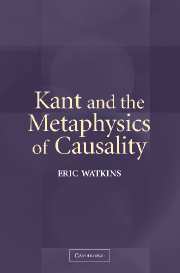Conclusion
Published online by Cambridge University Press: 12 January 2010
Summary
The goal of this book was to present Kant's views on causality in their proper historical context. One can abstract the following general picture from the details of the historical and philosophical arguments that have been presented in the preceding chapters. Kant was keenly interested in articulating a comprehensive account of causality throughout his career that could (1) account for our knowledge of temporality, (2) explain how freedom can be reconciled with determinism, and (3) be used to formulate a response to Hume's skeptical arguments. Because Kant's account of causality also has implications for his views on other topics, such as his philosophy of science, it constitutes a central element not only of the Critique of Pure Reason, but also of his philosophical thought more generally, insofar as it develops the resources with which he hopes to describe how different kinds of beings can act in different kinds of contexts.
In his first pre-Critical works, Kant held that causality in the form of mutual interaction is required for substances (1) to be connected so as to form a single (spatio-temporal) world and (2) to bring about changes in their states. For he argued (1) that causally isolated substances would, as Leibniz asserted, be “worlds apart” rather than members of a single world, and (2) that such substances would also, as Leibniz denied, be just as static and unchanging as the essential grounds that must be posited for these substances to exist in the first place. Moreover, Kant recognized that while adding causal relations to otherwise isolated substances does allow them to form a single world, this, by itself, does not allow one to explain how these substances could change.
- Type
- Chapter
- Information
- Kant and the Metaphysics of Causality , pp. 423 - 430Publisher: Cambridge University PressPrint publication year: 2004



